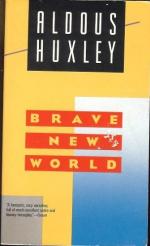|
|
Brave New World Topic Tracking: Government
Chapter 1
Government 1: The bleak, dominating Central London Hatchery and Conditioning Centre, a government-controlled building, is the first thing we see in the novel, accompanied by the World State motto: "Community, Identity, Stability" Chapter 1, pg. 1
Government 2: The government of the World State controls not only the social castes and mental processes of the embryos, but also the climates for which they are being designed and in which they will develop.
"And that," put in the Director sententiously, "that is the secret of happiness and virtue-liking what you've got to do. All conditioning aims at that: making people like their inescapable social destiny." Chapter 1, pg. 16
Chapter 2
Government 3: The government also controls desire and consumption by creating and destroying the demand for certain objects through the careful and intentional training of infants.
Government 4: The government controls the past by suppressing it entirely.
Government 5: "Till at last the child's mind is these suggestions, and the sum of the suggestions is the child's mind. And not the child's mind only. The adult's mind too-all his life long. The mind that judges and desire and decides-made up of these suggestions. But all these suggestions are our suggestions... Suggestions from the State." Chapter 2, pg. 28-29
The government uses sleep-teaching to create and reinforce the divides between the castes.
Chapter 3
Government 6: Mond, as World Controller, has participated in suppressing the past and all forms of individualism and culture. History is mocked and seen basically as bull.
Government 7: Mond is explaining that the government controls not only mental processes, but physical processes as well, such as aging.
Chapter 5, part 1
Government 8: The government controls birth, life, and death. When people die, they are sent to a government-controlled crematorium where the phosphorous is extracted from their ashes. This phosphorous is useful as fertilizer.
Chapter 5, part 2
Government 9: The "orgy-porgy" which Bernard and eleven other people attend is a government-sponsored and mandatory ceremony. It is important for two reasons. First, the participants summon up Ford, the god-surrogate created by the government. Ford is an all-powerful deity whose name derives from Sigmund Freud, a controversial psycho-sexual psychotherapist, and the concept of the Ford automobile company. Second, the orgy-porgy is mandatory, which shows how the government controls the sexual behavior of the citizens of the World State. The orgy-porgy is representative of how the government controls both religion and sexual practice.
Chapter 6, part 2
Government 10: The Director has the authority to reprimand Bernard for expressing thoughts that go against the teachings of the government.
Chapter 7
Government 11: Although the government has contained the people of Malpais, they do not control what goes on there, and therefore, there are all sorts of activities prohibited and considered pornographic in the World State, such as a variety of religions, monogamy, and parenthood.
Chapter 10
Government 12: The Director's humiliation is unprecedented. The caste system in the World State is rigid: superiors are superiors and inferiors are inferiors. Authority in the World State is not questioned, and certainly not challenged. For this reason, Bernard's upheaval of the Director is shocking.
Chapter 11
Government 13: The government takes infants in for Death Conditioning; infants get used to death as a part of life. They are rewarded with chocolate ice cream.
Chapter 15
Government 14: The Savage has attempted to overthrow the order of the government-controlled hospital, but the government has prepared measures against this type of event. The Savage is powerless against the government. They retaliate and regain control with soma gas and pre-recorded anti-riot speeches. The Savage is unable to cause chaos.
Chapter 16
Government 15: Mustapha Mond is a very multi-dimensional character. Although he is a figure of high authority, as one of only ten World Controllers, he has a background in subversive science. It is important to note that although he does own these texts, and he does discuss them with the Savage, he is not in the slightest bit at risk for being subversive, and upholds and believes in the codes of the World State to the fullest.
He is very well respected, though it is rumored that he owns forbidden texts such as the Bible. His power is never questioned by subordinates, who fear and respect his authority.
Chapter 17
Government 16: In this long and illuminating monologue, Mond makes clear to the Savage that the concept of God is not compatible with the government of the World State, and therefore, God no longer exists. The government of the World State is so absolute, that it has eliminated God. Mond also declares that the desire of the people, not just the government, has eliminated God.
"The gods are just. No doubt. But their code of law is dictated, in the last resort, by the people who organize society; Providence takes its cue from men" Chapter 17, pg. 236 The satisfaction of the desires of the people is what maintains stability, and with God and religion, this satisfaction of desire could not exist. Sin, religious morality, and righteousness are now outdated concepts. This discussion with Mond convinces the Savage that civilization makes him sick, and propels his self-exile.




